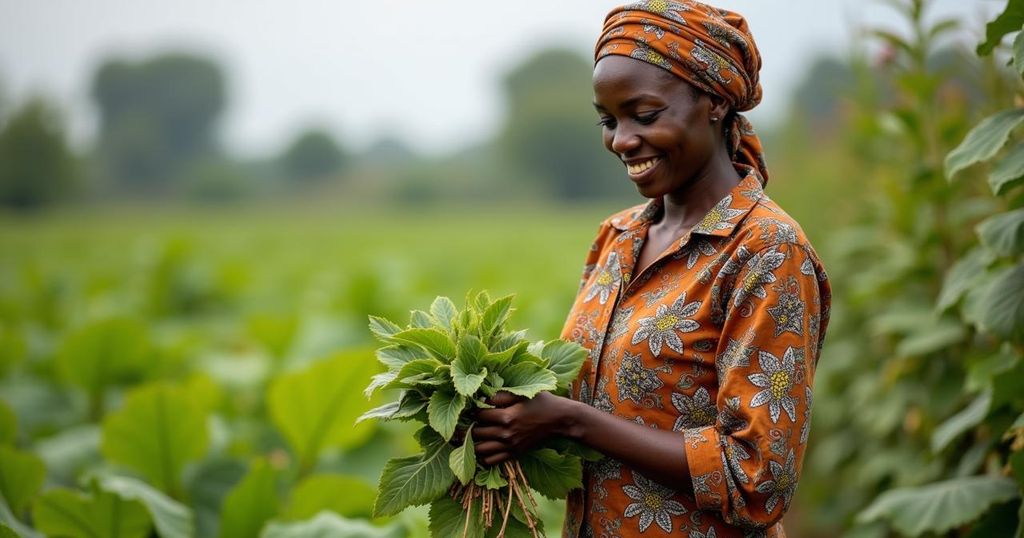In Ghana, women make up about 70 percent of the agricultural workforce and play a critical role in combating climate change through sustainable practices. Advocating for transformational changes in the agricultural sector, they emphasize the need for government action and the integration of agroecology in climate strategies. Environmentalist Awula Serwah underscores the importance of gender equality in climate leadership, promoting the idea that anyone dedicated to adaptation should lead, regardless of gender.
In Ghana, women represent approximately 70 percent of the agricultural workforce, predominantly comprising smallholder farmers who actively engage in ecological or organic farming practices. These practices not only minimize reliance on synthetic chemicals but also significantly contribute to environmental conservation. By adopting agroecological methods, women farmers play a vital role in promoting biodiversity, mitigating greenhouse gas emissions, reducing deforestation, and facilitating carbon sequestration. Their livelihoods are intricately tied to natural resources, prompting them to vigilantly protect these essential assets from environmental degradation. Organized as part of a broader social movement, Ghanaian women farmers advocate for transformative reforms within the agricultural sector, emphasizing the need for urgent climate action from the government. They call for the inclusion of agroecology as a fundamental element in the nation’s climate response strategies. Awula Serwah, a prominent Ghanaian environmentalist and coordinator for Eco-Conscious Citizens Ghana – an environmental organization based in Accra – sheds light on the unique challenges posed by climate change and environmental degradation, particularly affecting women and girls. She asserts that the impact of climate change transcends gender, stating, “Climate change and environmental degradation affect everyone. They are not respecter of persons.” She highlights the struggles faced by women in communities where they are responsible for food production, water collection, and fuel sourcing, reinforcing the urgency for collective action to alleviate the worsening situation. On the intersection of gender equality and climate resilience, Ms. Serwah advocates for open leadership roles in climate adaptation across genders. “Anyone with a passion, an understanding of climate adaptation and the necessary skills and willingness to lead, should lead. It is crucial that we work towards gender equality but we shouldn’t make climate change a gender issue,” she remarked. Referencing the legacy of Kenyan environmentalist Prof. Wangari Maathai, who established the Green Belt Movement and became the first African woman to receive the Nobel Peace Prize for her environmental activism, Ms. Serwah illustrates that a woman’s capability to lead in climate initiatives is rooted in passion and commitment rather than gender alone. “A determined woman with a lot on her plate can lead on climate adaptation just as well as a man… The key point is not that she was a woman, but that she was deeply passionate about the environment and was driven to make a difference,” she emphasized. Ms. Serwah further urges governments and policymakers to devise effective strategies that foster the involvement of women in climate change initiatives. She believes that women leaders in combating climate change should be met with support rather than barriers, positing that, “We all have a constitutional duty to protect the environment, and we should demand action.”
The article highlights the significant role of women in agriculture in Ghana, where they form the majority of the agricultural workforce. As smallholder farmers implementing sustainable practices, they serve as vital agents of change in combating climate change and advocating for environmental conservation. This issue becomes more pressing in light of increasing climate challenges that disproportionally affect women, making their voices crucial in policy-making discussions and initiatives aimed at ameliorating environmental impacts in agriculture.
In conclusion, women farmers in Ghana are at the forefront of addressing climate change through sustainable practices and advocacy. Their contributions not only enhance biodiversity and reduce emissions but also underscore the necessity for inclusive climate policies. Awula Serwah amplifies the call for gender equality in climate leadership and stresses the urgency for governments to empower women in these critical initiatives, thereby fostering a collaborative approach to environmental stewardship.
Original Source: www.un.org







